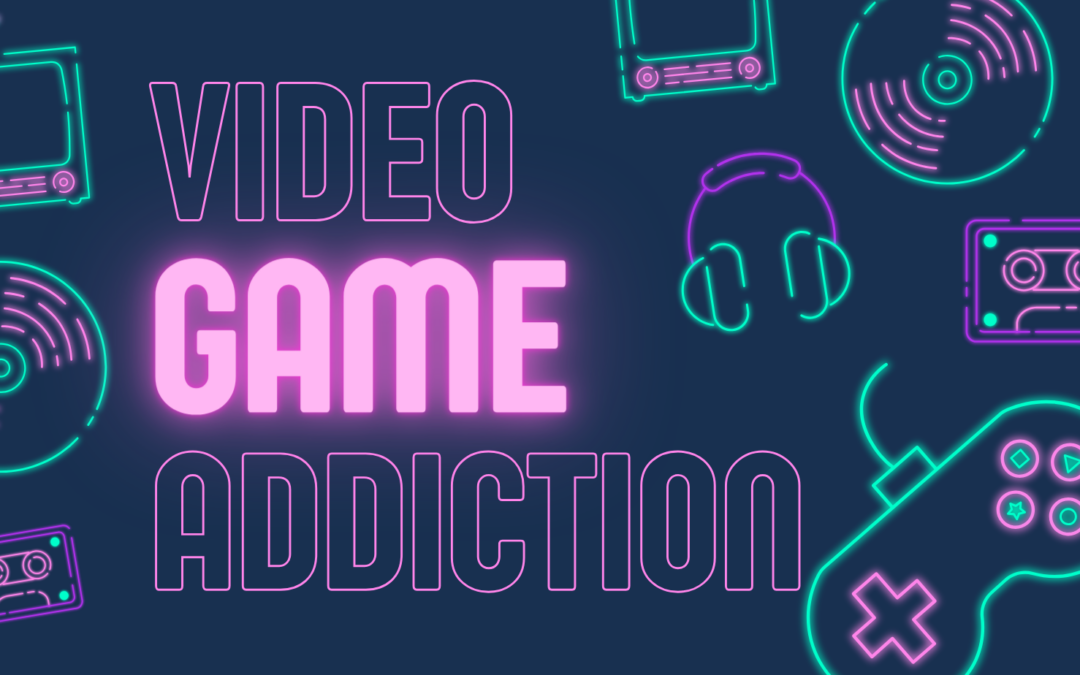Gaming can have its benefits as they help with problem-solving skills, reflexes, etc., but there are harmful effects when gaming too often. According to Healthy Gamer, 1% of the general population suffers from a video game addiction. Video games can negatively affect physical and mental health as addictive behaviors surface. Overall well-being can dive, with quality of life being sacrificed for video game time.
What is a Gaming Disorder?
The World Health Organization classifies gaming disorder as a mental health condition, in which the sufferer cannot control their gaming habits with a continuation or escalation of negative consequences.
Gaming disorder can lead to prioritizing video games over other things such as sleeping or going outside. Their behavior toward gaming is usually compulsive with an inability to shift their focus away from the game.
Video game addicts play for long hours at a time. It’s common for them to be unaware of time passing and the harmful effects their habits have. Participating in physical or social activities could be rare and personal or professional relationships are hindered. It is common for addicts to struggle with putting the controller down and have difficulty in finding other ways to spend their leisure time. They can develop a dependency on their gaming and gain a deep attachment to it. Their mind may be unable to focus on other subjects than gaming, even when they are not actively playing at that moment. Signs of Addiction Addiction do not look the same for everyone, but there are common symptoms and signs for those suffering from a video game addiction. The health and well-being of the addict are affected due to their gaming habits. Noticing changes in their behavior helps to know if their gaming habits are signs of addiction. Not all gamers are addicted and they can participate in gaming avidly without having addictive behaviors. Video gaming doesn’t need to be discouraged entirely, but there is a fine line between addiction and gaming for entertainment. School/Work Performance Unusual habits when it comes to school or work can be spotted among video game addicts. As they can physically and mentally struggle with turning off the game, their performance in school or work can be neglected. Their assignments could go uncompleted or they will skip classes or miss shifts. Teachers or employers could notice the effects of their gaming as grades fall or work ethics lower. Video game addicts could be at risk for dropping out of school or getting fired as their unhealthy habits and behaviors control their lives. Physical Health Video game addicts can experience physical symptoms from their excessive gameplay. The most common effect is due to their disrupted sleep schedule. As they spend long and continuous hours gaming, they suffer from a lack of sleep due to their late-night gameplay. Not receiving a healthy night of sleep can lead to tired eyes, headaches and migraines, and lethargy. With unhealthy sleep behaviors from their gaming habits, they can struggle with having energy throughout the day. This can result in irritation as they experience tiredness and other pain induced from a lack of sleep. Addictions often lead to neglections in their lifestyles. Personal hygiene or nutrition can suffer from video game addictions as their focus is on the game rather than on their personal health. Brushing their teeth or taking a shower can easily be forgotten when their mind is attached to their gaming. They often don’t take time to prepare meals and instead eat unhealthy junk food as it’s easier to have during gameplay. Additional pain can be experienced through excessive gaming as they can develop carpal tunnel syndrome. Although this is not always the case, gamers can feel pain in their wrists and fingers from the repetitive motions with a mouse or controller is required for gaming. Mental Health A common habit for video game addicts is isolation. They could spend hours at a time alone, in a dark room. This can negatively affect their mental wellbeing and possibly lead to depression or anxiety. Video game addictions cause an attachment to their gaming. Due to this, addicts can exhibit signs of impatience or agitation when they are not playing. They can
For gaming addicts, it often goes beyond entertainment. Playing times can expand past the typical leisure amount and obtaining a healthy lifestyle could be difficult for them. It’s more natural for them to spend an entire time playing a game rather than participating in other activities. This can lead to negative effects for their professional, personal, and educational lives.
What Causes It?
Addictions can develop through establishing a coping mechanism. Video games can be used as an outlet for avoidance—such as neglecting a social life or schoolwork—or as an unhealthy way to handle life stressors or pressure.
Video game addicts become dependent on their gameplay to the point where they are unable to function without gaming. Similar to other addictions, they can experience withdrawal symptoms once their gaming is removed or they attempt to stop.
Video gaming is a global phenomenon as billions of people participate in gaming from around the world. As a multibillion-dollar market, gaming is widely popularized and easily accessible. Since new games are frequently being released, video game addictions become more common due to their interactive, all-inclusive, and addictive designs.
Statistics show that 1–10% of gamers are at risk of addiction, with 94% of gamers being male. Videos games tend to be more attractive to young men as gaming is stimulating and provides distant social interactions through online gaming.
The Dangers of Gaming
Compulsive video game playing can affect the life of the gamer as it can lead to an addiction. Unhealthy behaviors of dependency can quickly develop, which causes sort or long-term effects. Depression, anxiety, and stress can arise from a gaming addiction, along with physical symptoms of a lack of sleep or nutrition. Being irritable throughout the day if they are unable to participate in gameplay. Extreme anger, irritability, and depression are indicators of game addiction. Steps to Overcoming Addiction There are a few ways to help someone who is suffering from gaming addiction. Support from loved ones is a crucial part of the recovery process as it’s not easy and could be temporarily painful for them to decrease their amounts of gameplay. Time Tracking One of the ways to assist in overcoming gaming addiction is to track game time. Allotting a certain amount of time per day for gaming helps to retrain habits and encourages them to find other activities to spend their leisure time. It’s easy for addicts to lose track of time while gaming. They can become unaware of how much time they are spending on the game or things they are missing out on due to it. Effectively tracking game time while setting a cut-off time allows them to restore their quality of life as they have the time to take care of themselves and find happiness away from their game dependency. Gaming Awareness For overcoming an addiction to be successful, it’s best for the addict to be aware of their habits and the dangers of their behavior. With that being said, it’s important to educate them on the benefits and positive aspects of gaming. The goods of gaming need to be communicated with the harms to help redirect their thoughts on gaming while not discouraging them entirely. Establishing healthy gaming behaviors for the household allows them to have the entertainment they prefer without letting it take over their life. Management Tools Leverage tools can help manage game time, such as a kitchen timer or time tracking apps. This can also help the addict gain some independence as they can gain responsibility for keeping a timer. Other software can be installed, such as “Cold Turkey Blocker,” to help limit what is accessible on their computer. For any limitations or restrictions, it’s important to have transparent communication. The addict will need to be able to contain some aspect of control over their lives or their agitation or irritability could worsen. Having open conversations about the limits that are set lets the addict feel they are involved in the decision-making. Conclusion Recognizing game addictive behaviors and habits is the first step to helping them overcome their addiction. Gaming can have harmful effects if overused, such as physical pain or mental distress. However, having a healthy gaming habit can have some benefits or improved reflexes or increased problem-solving skills. Understanding the difference between dangerous gaming patterns and healthy ones allows them to continue participating in gameplay while avoiding addictive habits. It’s important to have open communication about gaming habits to encourage addict lifestyle adjustments. At Forte Strong, we are dedicated to assisting the addict and their families in recovery. Quality of life should not be hindered through video game use and our Failure to Launch Treatment Program is catered to help young men overcome their addiction while educating them on life skills.

